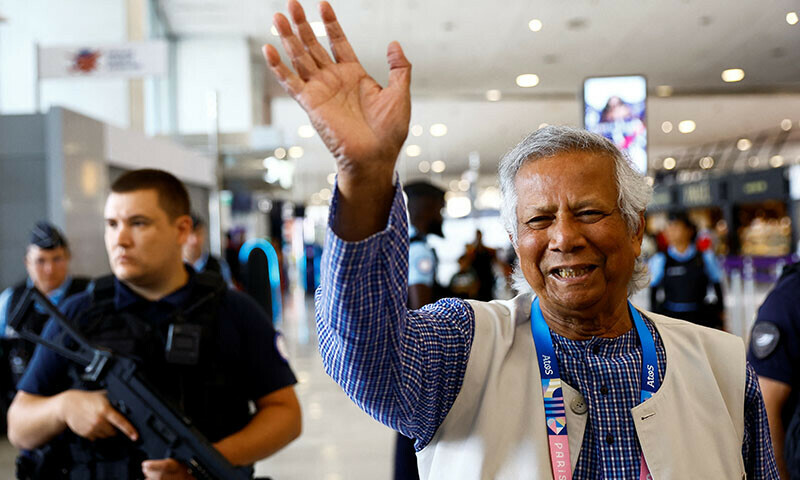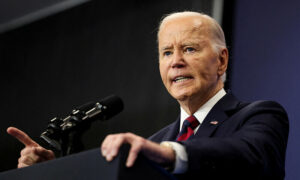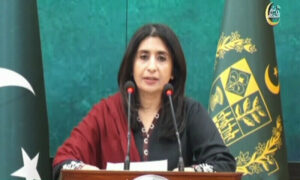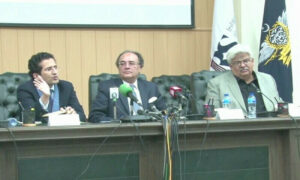• Court acquits interim govt head on appeal, overturns conviction
• New government to be sworn in today
• Khaleda Zia’s party calls for elections within three months
DHAKA: The Nobel Peace laureate tapped to lead an interim government in Bangladesh called for calm and boarded a flight on Wednesday to return home, a day before his new government is expected to be sworn in to replace ousted Prime Minister Sheikh Hasina.
Muhammad Yunus, 84, was picked by President Mohammed Shahabuddin to lead the new interim government, a key demand of student demonstrators whose uprising drove Hasina to flee to India on Monday.
He called on compatriots to be “ready to build the country”.
“Let us make the best use of our new victory,” he said in a statement to Reuters before departing Paris, where he had been receiving medical treatment while out on bail from criminal cases brought under Hasina. “I fervently appeal to everybody to stay calm. Please refrain from all kinds of violence.”
Outside the airport, he told reporters: “I’m looking forward to going back home and see what’s happening there and how we can organise ourselves to get out of the trouble that we’re in.”
“I’ll go and talk to them. I’m just fresh in this whole area,” said Yunus, an economist who was awarded the 2006 Nobel Peace Prize for founding a bank that pioneered fighting poverty with small loans to ordinary people.
President Shahabuddin said the rest of the interim government needed to be finalised soon to overcome the crisis and pave the way for elections. Nahid Islam, a key student leader, said he expected the members to be chosen by late Wednesday.
Army chief General Waker-Uz-Zaman said he was hopeful the interim government would be sworn in by late Thursday and that the situation in the country was improving and was expected to become normal in the next 3-4 days.
He also said that military leaders had held discussions with student leaders, political parties, and the president and that he was confident that Yunus would be able to take the country towards a democratic process.
President Shahabuddin also announced the appointment of a new police chief, Mohammad Mainul Islam, to replace Chowdhury Abdullah Al Mamun as part of a shake-up of the security top brass that also included a new head of the technical intelligence monitoring agency and changes among senior army officials.
‘No destruction or revenge’
Ahead of the arrival of Yunus, a court overturned his conviction in a labour case in which he was handed a six-month jail sentence in January.
The main opposition Bangladesh Nationalist Party (BNP), buoyed by its chief Khaleda Zia’s release from house arrest on Tuesday, drew hundreds of people to a rally in Dhaka and demanded elections within three months.
Khaleda Zia, 78, a former prime minister and Hasina’s arch rival, addressed the rally by video link, as did her exiled eldest son Tarique Rahman, who was introduced as the country’s next prime minister. Both called on their followers not to seek revenge.
“No destruction, revenge or vengeance,” Zia said from her hospital bed.
Her son said: “National elections should be held soon and power should be handed over to a government elected by the people at the earliest.”
Dream of change
Many Bangladeshis, particularly the young, hope the country is at a turning point. “I want freedom of expression. I want a corruption-free country. I want people to have the right to protest,” Noorjahan Mily, 21, an Open University student, told the BBC.
“I am uncertain about where the country is heading, because the government has changed. But whether the discrimination will remain or not, I will only be happy when their demands are met.”
Julkernayeem Rahat, a business administration student at University of Asia Pacific, told the BBC: “We are happy we’ve removed the autocratic government. We have gained our freedom and our sovereignty. Bangladesh’s future is in the hands of the student leaders. God willing, things will be good.”
Mahamudul Hassan, 21, studying on the same course, said: “I want democracy so that people of all walks of life can enjoy equal opportunities, equal rights.”
Mohammed Shwapan, who has been a Dhaka driver for 24 years, supports the choice of interim leader. “As Mr Yunus is well known internationally, he can mitigate any potential economic collapse. I am worried about the international debt, how will Bangladesh be able to manage payments. That’s why I think he can do a good job.”
Published in Dawn, August 8th, 2024





